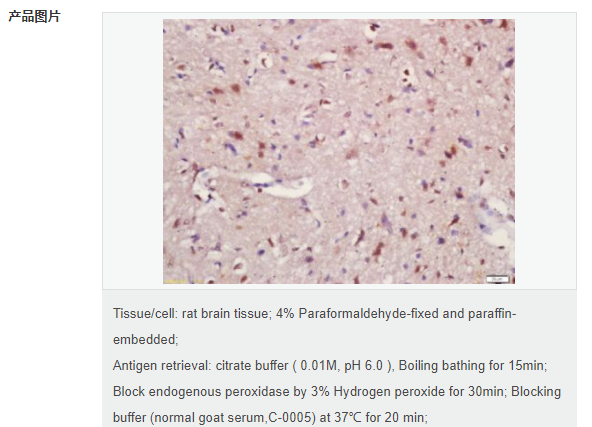
货号
产品规格
售价
备注
BN41657R-50ul
50ul
¥1486.00
交叉反应:Human,Rat(predicted:Mouse,Chicken,Dog,Pig,Cow,Rabbit,Sheep) 推荐应用:IHC-P,IHC-F,ICC,IF,ELISA
BN41657R-100ul
100ul
¥2360.00
交叉反应:Human,Rat(predicted:Mouse,Chicken,Dog,Pig,Cow,Rabbit,Sheep) 推荐应用:IHC-P,IHC-F,ICC,IF,ELISA
BN41657R-200ul
200ul
¥3490.00
交叉反应:Human,Rat(predicted:Mouse,Chicken,Dog,Pig,Cow,Rabbit,Sheep) 推荐应用:IHC-P,IHC-F,ICC,IF,ELISA
| 英文名称 | OLIG2 |
| 中文名称 | 少突胶质细胞转录因子2抗体 |
| 别 名 | Basic domain helix loop helix protein class B 1; Basic helix loop helix protein class B 1; bHLHB1; bHLHe19; Class B basic helix loop helix protein 1; Class B basic helix-loop-helix protein 1; class E basic helix loop helix protein 19; Class E basic helix-loop-helix protein 19; Human protein kinase C binding protein RACK17; Olig2; OLIG2_HUMAN; Oligo2; Oligodendrocyte lineage transcription factor 2; Oligodendrocyte specific bHLH transcription factor 2; Oligodendrocyte transcription factor 2; PRKCBP2; Protein kinase C binding protein 2; Protein kinase C binding protein RACK17; Protein kinase C-binding protein 2; Protein kinase C-binding protein RACK17; RACK17. |
| 研究领域 | 神经生物学 转录调节因子 表观遗传学 |
| 抗体来源 | Rabbit |
| 克隆类型 | Polyclonal |
| 交叉反应 | Rat, (predicted: Human, Mouse, Chicken, Dog, Pig, Cow, Rabbit, Sheep, ) |
| 产品应用 | ELISA=1:5000-10000 IHC-P=1:100-500 IHC-F=1:100-500 ICC=1:100-500 IF=1:100-500 (石蜡切片需做抗原修复) not yet tested in other applications. optimal dilutions/concentrations should be determined by the end user. |
| 分 子 量 | 32kDa |
| 细胞定位 | 细胞核 细胞浆 |
| 性 状 | Liquid |
| 浓 度 | 1mg/ml |
| 免 疫 原 | KLH conjugated synthetic peptide derived from human OLIG2:81-180/323 |
| 亚 型 | IgG |
| 纯化方法 | affinity purified by Protein A |
| 储 存 液 | 0.01M TBS(pH7.4) with 1% BSA, 0.03% Proclin300 and 50% Glycerol. |
| 保存条件 | Shipped at 4℃. Store at -20 °C for one year. Avoid repeated freeze/thaw cycles. |
| PubMed | PubMed |
| 产品介绍 | The oligodendrocyte lineage-specific basic helix-loop-helix (OLIG) family of transcription factors include OLIG1-OLIG3, which differ in tissue expression. OLIG1 and OLIG2 are specifically expressed in nervous tissue as gene regulators of oligodendrogenesis. OLIG2 is more widely expressed in embryonic brain than OLIG1, while OLIG3 is primarily expressed in non-neural tissues. OLIG1 and OLIG2 interact with the Nkx-2.2 homeodomain protein, which is responsible for directing ventral neuronal patterning in response to graded Sonic hedgehog signaling in the embryonic neural tube. These interactions between OLIG proteins and Nkx-2.2 appear to promote the formation of alternate cell types by inhibiting V3 interneuron development. OLIG1 and OLIG2 are abundantly expressed in oligodendroglioma and nearly absent in astrocytomas. Therefore, OLIG proteins are candidates for molecular markers of human glial brain tumors, which are the most common primary malignancies of the human brain. Function: Required for oligodendrocyte and motor neuron specification in the spinal cord, as well as for the development of somatic motor neurons in the hindbrain. Cooperates with OLIG1 to establish the pMN domain of the embryonic neural tube. Antagonist of V2 interneuron and of NKX2-2-induced V3 interneuron development. Subunit: Contains 1 basic helix-loop-helix (bHLH) domain. Subcellular Location: Nucleus. Cytoplasm. The NLS contained in the bHLH domain could be masked in the native form and translocation to the nucleus could be mediated by interaction either with class E bHLH partner protein or with NKX2-2. Tissue Specificity: Expressed in the brain, in oligodendrocytes. Strongly expressed in oligodendrogliomas, while expression is weak to moderate in astrocytomas. Expression in glioblastomas highly variable. DISEASE: Note=A chromosomal aberration involving OLIG2 may be a cause of a form of T-cell acute lymphoblastic leukemia (T-ALL). Translocation t(14;21)(q11.2;q22) with TCRA. Similarity: Contains 1 bHLH (basic helix-loop-helix) domain. SWISS: Q13516 Gene ID: 10215 Database links: Entrez Gene: 10215 Human Entrez Gene: 50913 Mouse Omim: 606386 Human SwissProt: Q13516 Human SwissProt: Q9EQW6 Mouse Unigene: 176977 Human Unigene: 37289 Mouse Unigene: 22121 Rat Important Note: This product as supplied is intended for research use only, not for use in human, therapeutic or diagnostic applications. |
